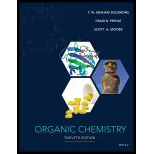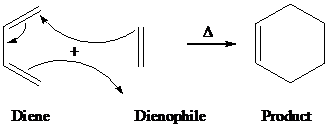
Concept explainers
Interpretation:
The structures of the product when 1,3-butadiene reacts with the given dienophiles are to be given.
Concept introduction:
舧 Diels–Alder is a type of organic reaction in which substituted
舧 The general reaction of Diels–Alder is as follows:

舧 The Diels–Alder reaction is between a conjugate diene and a reactant containing double bond (dienophile) to form the product and the product is called adduct.
舧 Diels–Alder reactions are highly stereospecific. The configuration of dienophile is retained in the product and the reaction is syn addition.
舧 The dienes react with dienophiles in cis forms rather than trans forms.
舧 Endo and exo refers to the orientation of dienophile and its electron withdrawing group when it reacts with a diene in Diels–Alder reaction.
舧 The reaction with orientation of electron withdrawing group of dienophiles under the
舧 The reaction with orientation of electron withdrawing group of dienophiles away from the
舧 Endo is favored in the transition state of Diels–Alder reaction because of its lower energy.
Want to see the full answer?
Check out a sample textbook solution
Chapter 13 Solutions
Organic Chemistry
- (a) Cyclohexa-1,3-diene can be converted into a tetrasubstituted haloalkane when reacted with bromine in ether. Write a balanced chemical equation for the reaction that occurs and state the expected observation. (b) Compound A and B are alkenes with the same molecular formula C5H10. Compound A is a branched-chain alkene while compound B is a straight-chain alkene. The reaction between compound A with hydrogen bromide produces major product C which is optically active. (i) Draw TWO (2) possible structures for compound B. (ii) Outline the mechanism for the reaction between compound A with hydrogen bromide to form major product C. (iii) Name the product formed when compound A undergoes bromination reaction.arrow_forwardCyclopentene reacts with reacts with ozone in dichloromethane at -78° C. Treatment of the resulting ozonide with zinc in acetic acid or with dimethylsulfide gives A(C3H3O2). Treatment of A with sodium borohydride in ethanol gives B(C3H12O2). Draw the structure of B.arrow_forward(S)-2-butanol reacts with potassium dichromate (K2CrO4) in aqueous sulfuric acid to give A(C4H3O). Treatment of A with ethylmagnesium bromide in anhydrous ether gives B(C,H140). Draw the structure of B.arrow_forward
- Write the structure of the major organic product formed in the reaction of each of the following with hydrogen bromide in the absence of peroxides and in their presence. (a) 1-Pentene (b) 2-Methyl-2-butene (c) 1-Methylcyclohexenearrow_forwardWhich of the following statements about 3-iodo-2-methylprop-1-ene is/are true? (i) It has an E isomer and a Z isomer. (ii) It can be converted to an alkyl lithium compound in one step by reacting with lithium metal. (iii) It would react with the following reagent to give 2-methylhept-1-ene as the product: CuLiarrow_forwardStarting from bromoethane, the formation of which of the following compound requires more than one step of reaction? 2 (a) Methoxyethane (b) Ethanol (c) Ethanoic acid (d) Ethenearrow_forward
- Write the equations for the preparation of 1-bromobutane from :(i) 1-butanol (ii) but-l-enearrow_forwardDevelop syntheses for the following compounds. As starting materials, you may use cyclopentanol, alcohols containing no more than four carbon atoms, and any common reagents and solvents. (a) trans-cyclopentane-1,2-diol (b) 1-chloro-1-ethylcyclopentanearrow_forwardGive the product(s) formed when 1-butene reacts with the following: (a) HBr (b) dilute H2SO4 (c) Br2 in CCl4arrow_forward
- A compound with formula C8H12 reacts with 2 molar equiv of H₂ to yield a cycloalkane. By treatment of this compound with acidic KMnO4, a dicarboxylic acid, HOOCCH2CH2COOH is obtained. What is the structure of this compound? (A) (B) (C) (D)arrow_forwardCompund ( A) C6H12 is treated with chlorine in the presence of carbon tetrachloride to given (B)C6H12Cl2.Compund (B) is treated with alcoholic KoH,followed by NaNH2 ,resulting in this formation of (C).compound (C) is treated with hydrogen in the presence of nickel catalysts to give 2methylpentane. Compound (C) does not react with sodamide or ammonical solution of silver nitrate .Ozonolysis of (A) give two aldehyde, (D) and (E) .Compound (E) is identified as acetaldehyde .From this information,describe the structural formula (A) ,(B) ,(C) And (C).write equation for all reactionarrow_forwardCompound A, C9H16 reacts with 1 molar equivalent(s) of hydrogen on catalytic hydrogenation. A undergoes reaction with ozone, followed by Zn treatment. What is the structure for A?arrow_forward
 ChemistryChemistryISBN:9781305957404Author:Steven S. Zumdahl, Susan A. Zumdahl, Donald J. DeCostePublisher:Cengage Learning
ChemistryChemistryISBN:9781305957404Author:Steven S. Zumdahl, Susan A. Zumdahl, Donald J. DeCostePublisher:Cengage Learning ChemistryChemistryISBN:9781259911156Author:Raymond Chang Dr., Jason Overby ProfessorPublisher:McGraw-Hill Education
ChemistryChemistryISBN:9781259911156Author:Raymond Chang Dr., Jason Overby ProfessorPublisher:McGraw-Hill Education Principles of Instrumental AnalysisChemistryISBN:9781305577213Author:Douglas A. Skoog, F. James Holler, Stanley R. CrouchPublisher:Cengage Learning
Principles of Instrumental AnalysisChemistryISBN:9781305577213Author:Douglas A. Skoog, F. James Holler, Stanley R. CrouchPublisher:Cengage Learning Organic ChemistryChemistryISBN:9780078021558Author:Janice Gorzynski Smith Dr.Publisher:McGraw-Hill Education
Organic ChemistryChemistryISBN:9780078021558Author:Janice Gorzynski Smith Dr.Publisher:McGraw-Hill Education Chemistry: Principles and ReactionsChemistryISBN:9781305079373Author:William L. Masterton, Cecile N. HurleyPublisher:Cengage Learning
Chemistry: Principles and ReactionsChemistryISBN:9781305079373Author:William L. Masterton, Cecile N. HurleyPublisher:Cengage Learning Elementary Principles of Chemical Processes, Bind...ChemistryISBN:9781118431221Author:Richard M. Felder, Ronald W. Rousseau, Lisa G. BullardPublisher:WILEY
Elementary Principles of Chemical Processes, Bind...ChemistryISBN:9781118431221Author:Richard M. Felder, Ronald W. Rousseau, Lisa G. BullardPublisher:WILEY





